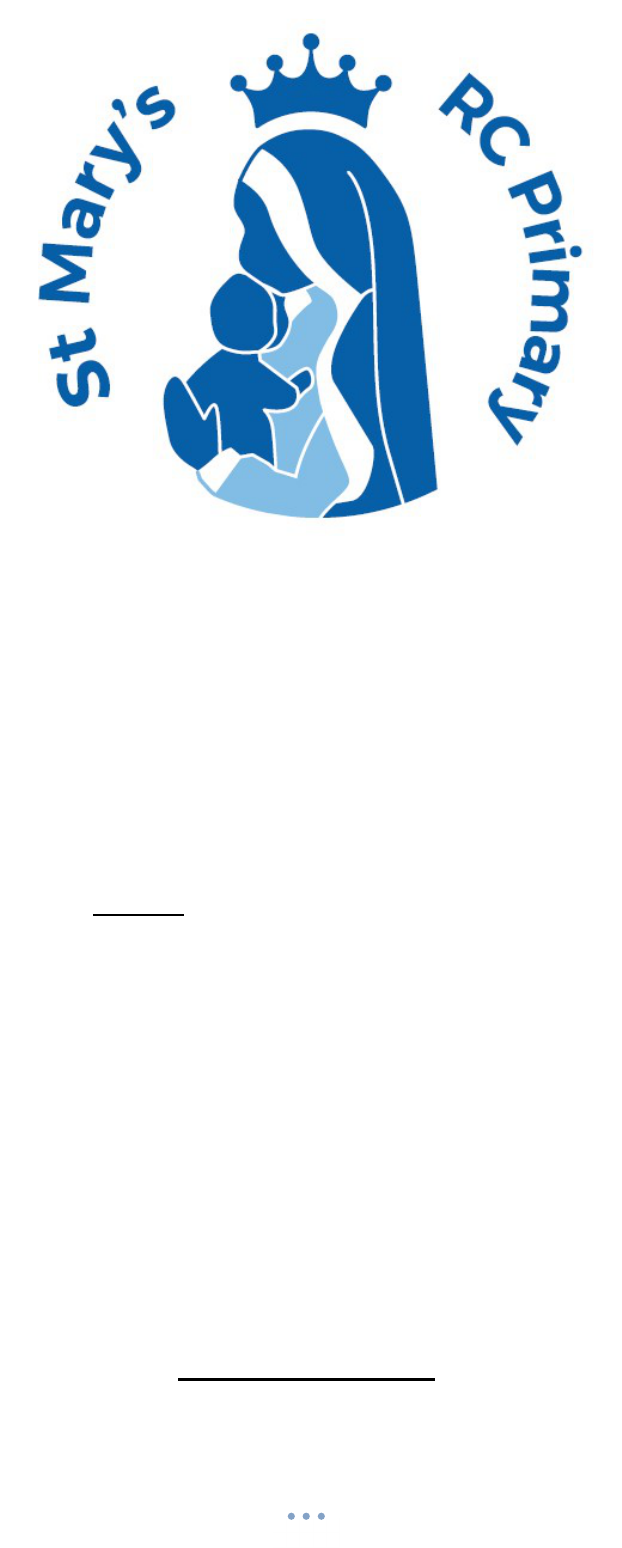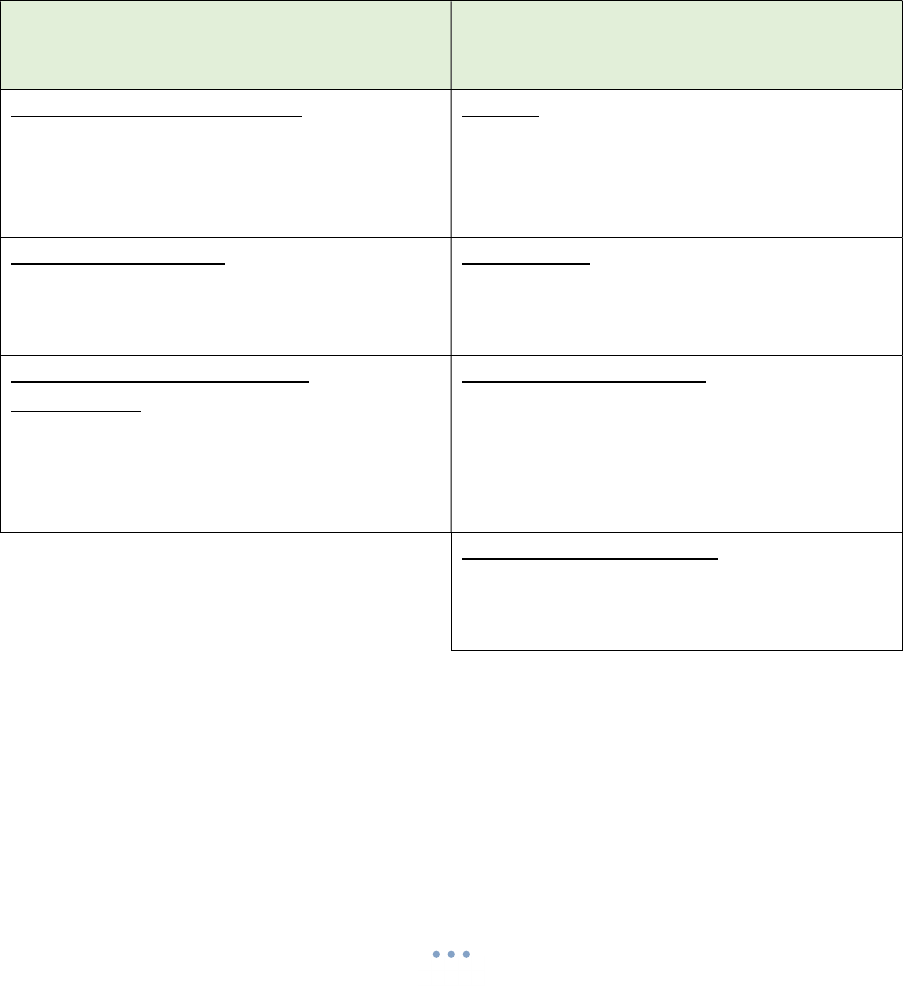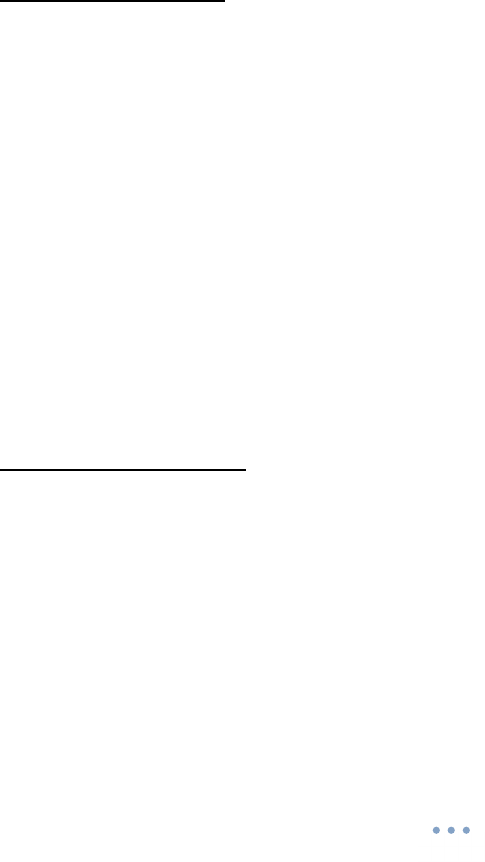
1
St Mary’s RC Primary School
and Nursery
Early Years Foundation Stage Policy
Vision: ‘A Journey to Excellence’
We believe that each child is made in the image and likeness of God
therefore we develop the ‘whole child’ to reach their individual
potential. We have high expectations and celebrate success both
academically and socially. We aim to provide an outstanding
Catholic education so that we can make a valuable contribution to
the community in which live and serve.
Mission statement:
‘We are happy living and learning in God’s Friendship’

2
Statement of intent
In the Early Years Foundation Stage at St Mary’s Catholic Primary school and Nursery, we
believe in providing a secure foundation for future learning and development for our pupils,
giving them the best possible start to their education in which Christian values are fostered.
We continuously encourage pupils to be independent, curious, creative and resilient
learners who show respect for each other, their communities and the wider world. Through
our personalised and skilled teaching and learning approach, we are able to offer children a
platform to be expressive, to feel valued and to feel empowered. As well as following the
children’s interests, our creative thematic curriculum is specifically planned for our pupils
with a careful balance of whole class teaching, group work and child-initiated play to
support children to reach their full potential. By establishing effective, trustworthy and
supportive relationships with our pupils, children enjoy their learning whilst achieving the
Early Learning Goals. We are committed to providing our children with the knowledge and
skills to make a positive difference and succeed in an ever-changing world.
This policy has been developed in conjunction with the relevant DfE guidance and legislation
to ensure that each child has a happy and positive start to their school life in which they can
build a foundation for a love of learning.
Legal framework
This policy has due regard to all relevant legislation and statutory guidance including, but
not limited to, the following:
• Childcare Act 2006
• Safeguarding Vulnerable Groups Act 2006
• UK General Data Protection Regulation (UK GDPR)
• Data Protection Act 2018
• DfE (2021) ‘Statutory framework for the early years foundation stage’
• DfE (2021) ‘Keeping children safe in education (2020)’
• DfE (2018) ‘Working Together to Safeguard Children’
• DfE (2015) ‘The Prevent duty’
Roles and responsibilities
The governing board is responsible for:
• Ensuring there is a policy in place to safeguard children that includes an
explanation of the action to be taken when there are safeguarding concerns
about a child, the use of mobile phones and cameras, and staff safeguarding
training requirements. These issues are addressed in part in this policy and in
further detail in the school’s Child Protection and Safeguarding Policy.
• Ensuring there is a policy in place in the event of an allegation being made
against a member of staff (including supply staff) or a volunteer. These issues are
addressed in the school’s Allegations of Abuse Against Staff Policy.
• Monitoring the implementation of this policy.
• Ensuring that this policy does not discriminate on any grounds.
• Handling complaints regarding this policy, as outlined in the school’s Complaints
Procedures Policy.

3
The EYFS lead, in conjunction with the headteacher, has responsibility for the day-to-day
implementation and management of this policy.
Staff, including teachers, support staff, supply staff and volunteers, are responsible for:
• Familiarising themselves with, and following, this policy.
• Remaining alert to any issues of concern in children.
Our school is committed to providing the best possible experiences for our children. The
EYFS Leader, along with SLT, is responsible for monitoring provision, teaching and learning
and children’s progress in EYFS.
All adults in the EYS have a key role in children’s learning and development. Therefore, they
are required to be knowledgeable and skilled in the EYFS curriculum.
Aims
Through the implementation of this policy, we aim to:
• Give each child a happy and positive start to their school life in which they can
establish a solid foundation for a love of learning.
• Enable each child to develop socially, physically, intellectually and emotionally.
• Encourage children to develop independence within a secure and friendly
atmosphere.
• Support children in building relationships through the development of social
skills such as cooperation and sharing.
• Work alongside parents to meet each child’s individual needs to ensure they
reach their full potential.
Four guiding principles shape our practice:
• Every child is a unique child, who is constantly learning and can be resilient,
capable, confident and self-assured.
• Children learn to be strong and independent through positive relationships.
• Children learn and develop well in enabling environments with teaching and
support from adults, who respond to their individual interests and needs and
help them to build their learning over time. Children benefit from a strong
partnership between the school and parents.
• Learning and development is important. Children develop and learn in different
ways and at different rates.
To put these principles into practice, our school:
• Provides a balanced curriculum which takes children’s different stages of
development into account.
• Promotes equality of opportunity and anti-discriminatory practice.
• Works in partnership with parents.
• Plans challenging learning experiences, based on individual needs, which are
informed by observation and assessment.
• Assigns each child with a key person to ensure that each child’s learning and care
is tailored to meet their individual needs
• Provides a safe and secure learning environment.

4
Learning and development
In partnership with parents, the school promotes the learning and development of pupils to
ensure they are ready for the next stage of education.
Our EYFS curriculum is based on loose themes and an observation of children’s needs,
interests and stages of development. Activities in school are planned to reflect these
interests and individual circumstances in order to provide each child with a challenging and
enjoyable experience.
There are seven areas of learning and development that must shape education programmes
in EYFS settings. These are split into two important and interconnected sections – prime and
specific:
In organising and implementing educational programmes, the school will ensure that a
broad range of activities and experiences are planned, having regard to three characteristics
of effective teaching and learning in the EYFS:
• Playing and exploring – children investigate and experience things.
• Active learning – children concentrate, keep on trying if they encounter difficulties
and enjoy their achievements.
The ‘prime’ areas of learning and
development are:
The ‘specific’ areas of learning and
development are:
Communication and language
- Listening, attention and
understanding
- Speaking
Literacy
- Comprehension
- Word reading
- Writing
Physical development
- Gross motor skills
- Fine motor skills
Mathematics
- Numbers
- Numerical patterns
Personal, social and emotional
development
- Self-regulation
- Managing self
- Building relationships
Understanding the world
- Past and present
- People, culture and communities
- The natural world
Expressive arts and design
- Creating with materials
- Being imaginative and expressive

5
• Creating and thinking critically – children have and develop their own ideas, make
links between ideas, and develop strategies for doing things.
Further information regarding learning and development are set out in our school’s Early
Years Teaching and Learning Policy.
Assessment
Assessment plays an important part in helping our school to recognise children’s progress,
understand their needs, plan activities, and assess the need for support.
Parents will be kept up-to-date with their child’s progress and development via termly
reports and two formal parental meetings per year; the EYFS lead will address any learning
and development needs in partnership with parents.
When children enter our setting, practitioners will interact and observe children to gauge a
baseline picture about the child’s level of achievement as well as their interests and learning
styles. From this, ongoing formative assessments are used to assess the day-to-day learning
and development of children in the EYFS throughout the year. Practitioners will use this
information to shape learning experiences for each child. Recorded observations will
document ‘wow’ moments of children, showing evidence of their own personal progress.
Observations will be hand written on coloured post-it notes in accordance to the school
term. They will be collated in each child’s own personal Learning Journey.
Learning Journeys will build a progressive and personalised picture over time of a child’s
development whilst within our setting; practitioners will use this, alongside ongoing
formative assessments to inform planning as well as half-termly judgements as to whether
the child is ‘on track’ or ‘not on track’ in meeting their year group expectations. This will be
documented and tracked using the digital Lancashire Tracker.
Where children need specific targeted support, an intervention will be put in place for a
period of time. Interventions are planned and tracked provision mapping and are adapted
according to on-going assessment for learning.
Our EYFS setting will undertake a summative assessment of the level of each child’s
development at certain stages. These are:
• Reception Baseline Assessment – a short assessment which is taken within the first
six weeks of a child starting Reception year.
• The EYFS Profile – a comprehensive assessment completed at the end of the EYFS to
provide a well-rounded picture of a child’s knowledge, understanding and abilities,
attainment against the early learning goals (ELGs), and their readiness for Year 1.
• CEM Assessment – Reception children will also complete a short digital assessment
alongside the RBA, this will be repeated at the end of the year.
Our school reports EYFS Profile results to the LA when these are requested. The LA is under
a duty to return this data to the relevant government department.

6
Reasonable adjustments will be made to the assessment process for children with SEND as
appropriate.
The EYFS lead will discuss any cause for concern in a child’s progress with the child’s parents
and SENCo, especially where this concern relates to the prime areas of learning. A strategy
of support will be agreed upon and consideration will be taken as to whether the child may
have SEND which requires additional support.
Our school takes reasonable steps to provide opportunities for children with EAL to use their
home language in play and learning whilst also ensuring that these children have sufficient
opportunities to reach a good standard of English. During assessment, if it is found that a
child does not have a strong grasp of English language, the EYFS lead will contact the child’s
parents to establish their home language skills to establish whether there is cause for
concern about a language delay.
Inclusion
All children are valued as individuals irrespective of their ethnicity, culture, religion, home
language, background, ability or gender.
Using our EYFS curriculum, learning is personalised in order to meet the needs of the
individual child and support them at their own pace.
The Equal Opportunities Policy ensures that the needs of all children are met, regardless of
any protected characteristics they have.
The Special Educational Needs and Disabilities (SEND) Policy ensures all children receive the
support they need and are given the best learning experience possible. SEND in the EYFS
setting will be monitored and managed by the school’s SENCO.
The learning environment and outdoor spaces
The classroom is organised in such a way that children can explore and learn in a safe
environment.
Children have access to an enclosed outdoor play area, and daily outdoor activities are
planned, unless circumstances, such as the weather, would make outdoor activity
inappropriate and unsafe.
A thorough risk assessment is in place for the indoor and outdoor spaces in Nursery and
Reception.
There are two toilet facilities available to the EYFS, the toilets within the nursery classroom
for nursery children and the shared Reception/KS1 toilets for Reception children. There are
hygienic changing facilities located within the nursery classroom containing a supply of
towels, spare clothes and nappy changing equipment.
Safeguarding and welfare

7
All necessary steps are taken to keep the children in our care safe and well.
Any safeguarding or welfare issues will be dealt with in line with the Child Protection and
Safeguarding Policy, and all members of staff in the EYFS are required to read this policy as
part of their induction training.
The Lead DSL: Claire Mills
The deputy DSL: Mrs Rothwell
Other DSLs: Amy Oldham, Sally Berry and Vicky Cunningham
The DSL is responsible for safeguarding children and liaising with local children’s services as
appropriate. The deputy DSL will undertake the duties of the DSL in their absence, but
overall responsibility for safeguarding will remain with the DSL. The DSL and deputy DSL will
undertake child protection training as required.
Staff will receive safeguarding training that enables them to understand the safeguarding
policy and procedures, have up-to-date knowledge of safeguarding issues, and recognise
signs of potential abuse and neglect. All safeguarding and welfare concerns are to be
recorded on CPOMS.
Staff within EYFS will receive supervision in the form of 1:1 (if required/requested) and as a
group once per half term; the EYFS Lead will conduct this.
Health and safety
Our school will promote the good health of children in the EYFS, including the promotion of
good oral health.
EYFS staff will report any accident or injury involving a child to their parents on the day it
occurs, and any first-aid treatment administered to a child will also be reported to their
parents.
Accidents and injuries will be recorded in an accident book, located in the school office. The
headteacher will report any serious accident, illness, injury, or death of a child whilst in the
school’s care to Ofsted as soon as is reasonably practicable, but within 14 days of the
incident occurring. Local child protection agencies will also be notified.
A first-aid box is located in the nursery changing area and in the Reception classroom.
Our school’s Administering Medication Policy outlines the procedures for administrating
medicines.
The headteacher will notify Ofsted of any incidents of food poisoning affecting two or more
children within 14 days of the incident. Information about any dietary requirements,
preferences, food allergies and any special health requirements a child has will be recorded.
Fresh drinking water is available at all times.

8
Smoking is not permitted on the school premises.
The Health and Safety Policy outlines the full health and safety policies and procedures.
Our school has a Fire Evacuation Plan in place.
Staffing
Our school follows the Lancashire Human Resources procedures and policies, which aim to
ensure that members of staff employed in the EYFS are suitable.
Upon employment, all EYFS staff receive induction training to ensure that they understand
their roles and responsibilities, including information about emergency evacuation
procedures, safeguarding, child protection and health and safety.
Staff will be supported to undertake the appropriate training and professional development
to ensure children receive the best quality learning experience.
All members of staff who have contact with children and families will be supervised by the
EYFS lead. The supervision will provide opportunities for staff to:
• Discuss any issues, particularly concerning the development or wellbeing of children,
including any child protection concerns.
• Identify solutions to address issues.
• Receive coaching to improve their effectiveness.
The EYFS lead holds a 2:1 in BA (Hons) Primary Education with QTS qualification. The
Nursery Practitioner is also a HLTA who holds an Early Years Foundation Degree and a Level
3 Teaching Assistant working within EYFS. All Teaching Assistants in EYFS hold a full and
relevant level 2 and level 3 qualification.
The Deputy Headteacher will provide cover for the EYFS lead in their absence and is deemed
fully qualified to do so by the EYFS lead and headteacher.
There will be at least one member of staff who has a current paediatric first-aid (PFA)
certificate on the school premises at all times, and will accompany children on any school
outings.
Any member of staff who has sole responsibility for looking after a group of children will
hold a PFA certificate. All newly qualified staff with a level 2 or 3 qualification will be PFA
trained. Our school will organise PFA training to be renewed every three years. The list of
staff who hold PFA certificates can be found in the main office.
Our school provides a staffing ratio in line with the safeguarding and welfare requirements
set out in the ‘Statutory framework for the early years foundation stage’. Only members of
staff with level 2 English and maths qualifications will count towards the staffing ratios at
level 3.

9
Our school adopts the following staffing ratios:
For children aged three and over:
• Where a staff member with qualified teacher status (QTS), early years professional
status, or another suitable level 6 qualification is working directly with the children,
there is one member of staff for every 13 children, and at least one other member of
staff holds a full and relevant level 3 qualification.
• Where a staff member with qualified teacher status (QTS), early years professional
status, or another suitable level 6 qualification is not working directly with the
children, there is one member of staff for every 8 children, and at least one other
member of staff holds a full and relevant level 3 qualification.
For children in Reception classes:
Class sizes will be limited to 30 pupils per school teacher.
Only under exceptional circumstances, and where the quality of care and safety of children
is maintained, will changes be made to the ratios. Parents will be informed about staffing
arrangements and, when relevant and practical, will be involved in staffing arrangement
decisions.
Key person
In Nursery, there are two key workers and each child is assigned a key person whose role it
is to help ensure that every child’s care is tailored to meet their individual needs. The
nursery lead practitioner will inform parents of whom their child’s key person is and will
explain the role of the key person when their child begins attending the nursery.
In Reception, the key person for the class is the class teacher and will work collaboratively
with the teaching assistant to ensure that every child’s care is tailored to meet their
individual needs.
Parental involvement
We firmly believe that the EYFS cannot function without the enduring support of parents.
Parents are invited to 2 parents’ evenings per year (Autumn and Spring); however, our
school has an open-door policy and parents are welcome to talk to teachers at the start and
end of the school day. Parents will receive a report on their child’s progress termly.
A private space, such as the Headteacher’s office, will be utilised for confidential discussions
between staff and parents.
Parents are asked to sign permission slips for any visits out of school, use of photographs of
their child and using the internet at school.
Parents are asked to complete admission forms, a medical form and to write a brief synopsis
about their child to help the school to understand their character and personality.

10
Where relevant, parents are asked to complete a health care plan and/or intimate care plan
alongside the teacher.
In nursery, parents are asked to complete a safe collections form where they detail who has
permission to collect their child along with a password. This information is made available
to all members of staff working within nursery and to the main school office.
In nursery, parents are asked to complete and sign a contractual agreement which outlines
how their child’s hours will be used and any additional sessions, including charges.
Parents are encouraged to complete home learning with their child at home. In nursery,
children can have access to the nursery library to read books with their parents and are
given ideas to support their child via the online notice board. In Reception, children take
home a reading book and a piece of English and/or Maths learning each week to work
through with parents.
Transition periods
Transition into Nursery
The following process is in place to ensure a successful transition into our nursery setting:
• Setting in meeting/stay and play: In nursery, parents are invited to a settling in
meeting where their child can experience the setting for a short period of time for a
stay and play. The parents will have the opportunity to look around the setting,
discuss any questions they may have and complete any necessary paperwork with
the nursery practitioner. Children can join our setting from their 3
rd
birthday. Settling
in meetings/stay and play can take place prior to their agreed starting date.
• Children will then begin on their agreed start date and will stay for 2 hours for their
first session. After the session, the nursery practitioner will discuss with parents how
their child has been and agree with parents the length of the next session.
• Children’s sessions will be gradually built up in length over a few days and will be
personalised to each child and their needs, this will be agreed with parents.
• If the child has come from another nursery, the nursery practitioner will contact
them for the relevant paperwork and to gain any relevant information.
Transition into Reception
The following process is in place to ensure a successful transition into Reception:
• In the Spring term, following the national announcement on Primary School places,
all parents are contacted via the telephone by the Reception teacher to welcome
them to our school and to discuss any initial thoughts or worries the parent may
have. New parents to the school are offered a home visit which will take place by the
Reception teacher and another relevant professional from our school.
• In the Summer term, all children will be invited to a series of transition sessions
which build up in length of time. Children will spend time in their new classroom and
become familiar with their new peers and the adults who will work with them.
• On the final transition session, parents are invited in for a welcome meeting where
there will be a short presentation and a chance to chat to the EYFS Lead and the SLT

11
at our school. Parents will also receive a welcome pack which contains information
about our school along with some transition activities for parents to do with their
child.
• Where a child attends a different nursery, the Reception teacher will contact the
nursery to collect any paperwork and discuss any relevant information.
• Towards the end of the Summer term, Nursery and Reception staff will meet to
discuss each child’s development in order to support a smooth transition to
Reception.
Transition into Year 1
The following process is in place to ensure children’s successful transition to Year 1:
• In the Summer term, Reception children will take part in a whole school transition
session where they will spend time in their new classroom with their new teacher
and teaching assistant.
• In the final weeks of the Summer term, Reception children will begin to attend break
times with KS1 to familiarise themselves with the playground and a new routine.
• Towards the end of the year, Reception and Year 1 staff will meet to discuss each
child’s development in order to support a smooth transition to Year 1.
• During the first term of Year 1, children will access to continuous provision.
Monitoring and review
This policy is reviewed annually by the EYFS Lead, the governing board and the headteacher.
Any changes made to this policy will be communicated to all relevant stakeholders.
All members of staff directly involved with the EYFS are required to familiarise themselves
with all processes and procedures outlined in this policy as part of their induction.
This policy was updated in September 2021 by A.Oldham. The next scheduled review date
for this policy is September 2022.
